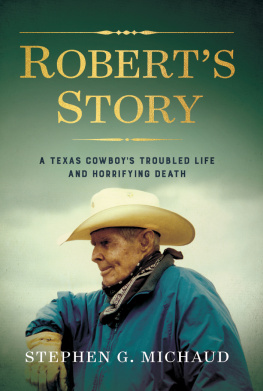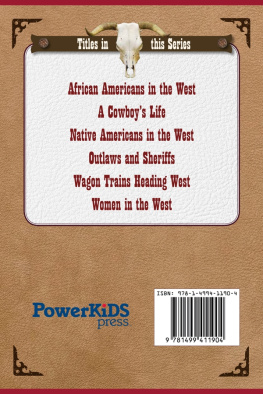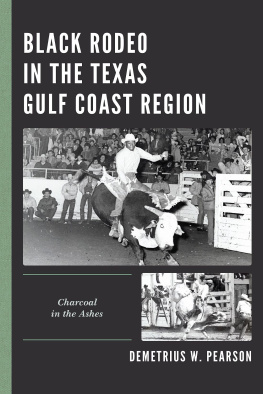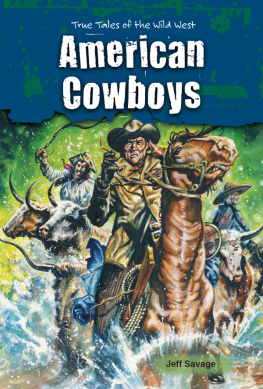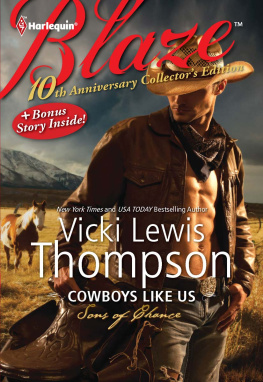NEW YORK UNIVERSITY PRESS
New York and London
www.nyupress.org
2010 by New York University
All rights reserved
Library of Congress Cataloging-in-Publication Data
Moore, Jacqueline M., 1965
Cow boys and cattle men: class and masculinities on the nineteenth-century Texas frontier / Jacqueline M. Moore.
p. cm.
Published in cooperation with the William P. Clements Center for Southwest Studies, Southern Methodist University.
Includes bibliographical references and index.
ISBN-13: 9780814757390 (cloth: alk. paper)
ISBN-10: 0814757391 (cloth: alk. paper)
1. CowboysTexasHistory19th century. 2. RanchersTexasHistory19th century. 3. MasculinityTexasHistory19th century. 4. Sex roleTexasHistory19th century. 5. Ranch lifeTexasHistory19th century. 6. Frontier and pioneer lifeTexas. 7. TexasSocial life and custom19th century. 8. Cattle tradeSocial aspectsTexasHistory19th century. 9. Social classesTexasHistory19th century. 10. TexasSocial conditions19th century.
I. William P. Clements Center for Southwest Studies. II. Title.
III. Title: Cowboys and cattlemen.
F391.M934 2009
305.336362130976409034dc22 2009026858
New York University Press books are printed on acid-free paper, and their binding materials are chosen for strength and durability. We strive to use environmentally responsible suppliers and materials to the greatest extent possible in publishing our books.
Manufactured in the United States of America
10 9 8 7 6 5 4 3 2 1
Acknowledgments
No author writes alone, and in producing this book I have been especially grateful to receive input from a large number of scholars, as well as help from archivists and courthouse staff. Ultimately, of course, any responsibility for errors and misinterpretations lies with me alone. I am particularly grateful to my colleague, Light Cummins, who has been encouraging at all times, has helped me tremendously with the historiography and contextualization, and who generously read and commented on both the initial proposal and the first complete draft of the book. He has been truly valuable. I am very grateful for the financial support Austin Colleges Richardson endowment has given me to carry out the early research, as well as for my fellow faculty members continuing interest in my topic and their moral support. I am also greatly indebted to the Summerlee Foundation, which enabled me to spend a year-long sabbatical at the excellent William P. Clements Center for Southwest Studies at Southern Methodist University as the 20072008 Summerlee Foundation Research Fellow in Texas History. The fellowship generously funded me to finish my research travel and also to present my findings at an international conference on the history of masculinity at Birkbeck College, University of London, in May 2008.
The Clements Center staff and faculty have helped me to see my work from a variety of perspectives and have significantly enhanced my book through their hosting of a manuscript workshop in January 2008. Two excellent outside historians, Louis Warren and Robert L. Griswold, were kind enough to take part in this workshop and offered close readings and excellent suggestions for improvement. Thanks also to Benjamin H. Johnson for chairing the workshop so admirably and to Edward Countryman, David D. Doyle, Clark Pomerleau, Glen Ely, Julia Schiavone Camacho, Joaqun Rivaya-Martnez, Tim Bowman, Christy McPherson, Dale Topham, and Andrea Boardman for participating in the workshop and for giving me so many good comments to help improve and tighten up my work and situate it within existing scholarship. David Doyle was good enough to read a rewrite of and made excellent suggestions for improvement. I am especially grateful to Ed Countryman for sharing his wisdom on Western film and art and also for agreeing to write a book for the series, I hope its not too much! Sherry Smith has been a joy to office next to this year, and also gave me great comments on the first draft as well as the insights of her incredible professional expertise. Julia, Joaqun, and Dan Herman, as fellow fellows, have been great sounding boards and good colleagues to get to know. Andrea Boardmans attention to detail is astonishing, and I always knew I was in good hands. Hope you liked the postcards! RuthAnn Elmore earns a medal for supplying me with the necessary candy to go on and for allowing me to bore her endlessly with excerpts of some of the terrible writing I encountered in the course of research. Thatand she provided great administrative support as well!!
I have benefited tremendously from conversations with a number of scholars and individuals. Panhandle historian Frederick W. Rathjen very patiently listened to me explain my thesis and sources and suggested others for me while I was in Canyon, Texas. Robert Griswold put me in contact with cowboy historian William W. Savage Jr., who kindly identified a number of factual errors in my first draft and gave me good suggestions for sources. While I know he does not agree with all my interpretations, I hope that at least I have no longer misrepresented any facts, and I wish to thank him for being so gracious. Homero S. Vera, Museum Coordinator of the Kenedy Ranch Museum in Sarita, Texas, helped me greatly by advising me on area archives and what to look for there. He also helped me think more clearly about the vaqueros on the South Texas ranches and the Anglos that live among them. Caleb Roach also offered good suggestions for specific collections in Alpine. I have also been helped in informal or brief discussions with a number of people, including an anonymous audience member at the very first paper I gave on the topic at the Texas State Historical Association in 2001, who first helped me to think about how the work made the man, and the owner of the Maverick Inn in Alpine, Texas, who told me about cowboys macho attitude toward hardship. Thanks also to Sean Brady, the convener of the London conference, for giving me a forum for my research, and to Harry Brod who, along with many other excellent scholars in attendance, gave me confidence in my works place in the historiography of masculinity.
Not surprisingly, I have visited many archives in the process of researching this book and have incurred debts at all of them. Lacking organization, moreover, I usually showed up with little to no notice and proceeded to run through a significant portion of their holdings, so I am especially grateful for their patience and help. I have probably spent the most time over the years at the Center for American History at the University of Texas in Austin. I wish to thank the excellent staff as a whole there, most of whom I have troubled at one time or another. As I did the bulk of the pulls over two weeks nearly ten years ago, the graduate student workers who did the most physical labor have now no doubt gone on to their own careers, so I thank them and wish them well. The staff at the Southwest Collection at Texas Tech University in Lubbock also graciously put up with me romping through their records several years ago. They were superb help and their finding aids were wonderful. I also thank the archivist for letting me bring in a pillow to read microfilm more comfortably and then letting me call her at home and arranging for security to let me in to retrieve the pillow when I left it there! Becky Livingston, acting archivist of the Panhandle Plains Historical Museum in Canyon, was a great help to me finding boxes in yet another romp through the records, as was Emily Armer. The staff of the highly efficient Archives of the Big Bend at Sul Ross State University in Alpine patiently helped me to search their catalogue and then equally patiently brought out the reams of files I needed and suggested other collections. Sara Schueneman at the South Texas Archives on the campus of Texas A & M University, Kingsville, allowed me to abduct her desk while I searched the catalogue and found all the tapes and files I needed, despite the fact that they were getting ready to move the Archives to the new location. Jesenia Guerra, archivist at the Corpus Christi Museum of Science and History, also took a morning to help me look at some King-Kenedy correspondence and records, although unfortunately all predated my period of study. Finally, Jim Bradshaw, archivist at the J. Evetts Haley Memorial Library and History Center in Midland, provided great help as well as encouragement going through Haleys interview files as I finished up my last day of research at the end of a 2,500-mile trip. He truly tempted me to stay longer, and I only wish I had had more time to do so.


